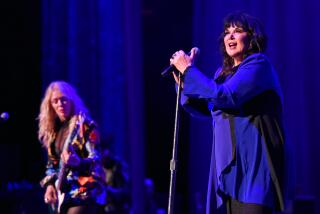Liberiaâs Leymah Gbowee: The power of the powerless
Friday morning, Liberian peace activist Leymah Gbowee â along with her countryâs president, Ellen Johnson Sirleaf, and Yemeni activist Tawakul Karman â was awarded the Nobel Peace Prize. A decade ago, this moment would have seemed unthinkable. But Gboweeâs triumph, like last springâs Arab uprisings, is a powerful reminder that in the 21st century world, change often comes from the bottom â not from a countryâs armies but its people.
In 2001, Liberia was in the grip of a civil war that had been going on for years and that had decimated the country. More than 100,000 people had died, many of them children, and countless women had been raped. As many as a third of Liberians had been displaced. Much of the countryâs infrastructure â its sewage and electrical system, roads, hospitals and schools â lay in ruins. Thousands of boys had been pressed into fighting for one side or another, fed liquor and drugs and turned into killers.
Gbowee, then a newly graduated social worker and struggling single mother of four, had herself lived in a refugee camp for a time, and had been forced to send her young children away to Ghana for their safety. Anguished and angry, one night she had a powerful dream in which a mysterious voice ordered her to âgather the women to pray for peace.â That vision led to a weekly prayer gathering. But she knew it would take more.
Then-President Charles Taylor had forbidden public opposition to his policies. The men of Liberia, even those who wanted the war to end, were doing nothing. Gbowee believed it would be up to the countryâs women, their resolve sharpened by suffering, to bring peace.
In Gboweeâs view, the women of Liberia had been pushed to their limits; pushing back was their only hope for survival. What was there to be afraid of, she asked, when they had already endured the unspeakable?
On April 14, 2003, in a protest organized through the African Women in Peacebuilding Network, thousands of women dressed in white gathered in a field along the capital of Monroviaâs central road and refused to leave. Christians and Muslims, young and old, educated and illiterate, all sat together to voice a single demand: âThe women of Liberia want peace.â
The women picketed in downtown Monrovia, they held events and news conferences, but mostly they sat, day after day, month after month, in searing heat and pouring rain, demanding that attention be paid. With outreach, the protests soon spread to rural counties, and across Liberia.
That summer, even as violence and misery exploded in Monrovia, peace talks began in Ghana. When they seemed to be going nowhere, Leymah and her sisters in the womenâs network organized Liberian women living in exile in Ghana to gather outside the hotel where representatives of Taylor and the various rebel warlords met each day and accomplished nothing. Finally, in rage and despair, she organized a sit-in that in effect locked the diplomats in their conference room. They will feel the pain of what our people are feeling at home, declared her âransomâ note. âWe are tired of the killing of our people!â she told journalists.
In the face of the womenâs actions, the talks grew more serious. Taylor left Liberia, peace finally came, and in 2005, after more strategic organizing by women, Liberia elected Ellen Sirleaf Johnson to be Africaâs first modern-day female head of state. Today, even as the country struggles economically, peace endures.
Itâs tempting to see todayâs citizen revolutions as something created by technology, uprisings grown of instant messages, mobile uploads, Facebook. Yes, those media are useful organizing tools, but they are not the point. No social networks existed 10 years ago in Liberia; much of the country still lacks not just Internet access but reliable electricity. What mattered, what continues to matter, is that leaders with vision reached out to the disenfranchised and miserable, offering them a way to take action, a way to hope.
Movements begin with people who can imagine the possibility of change and communicate that vision. How did a movement of âordinaryâ Liberian women change history? Listen to Leymah: âYou can tell people of the need to struggle. But when the powerless start to see that they really can make a difference, nothing can quench the fire.â
Carol Mithers is a Los Angeles Journalist and the coauthor, with Leymah Gbowee, of the memoir âMighty Be Our Powers: How Sisterhood, Prayer, and Sex Changed a Nation at War.â https://www.mightybeourpowers.com
More to Read
A cure for the common opinion
Get thought-provoking perspectives with our weekly newsletter.
You may occasionally receive promotional content from the Los Angeles Times.










